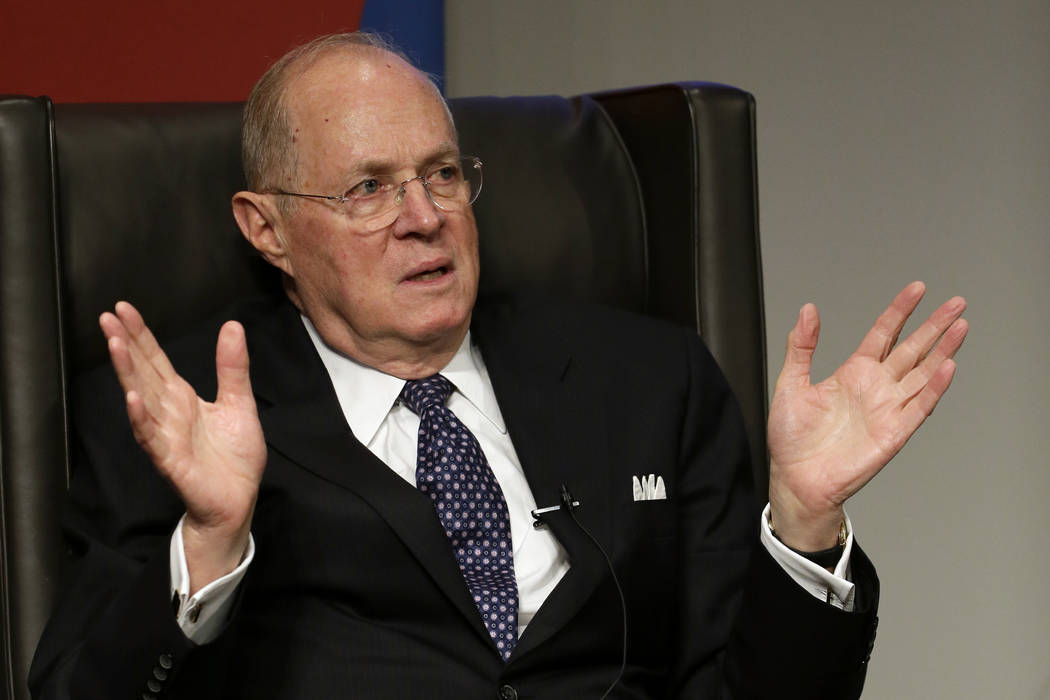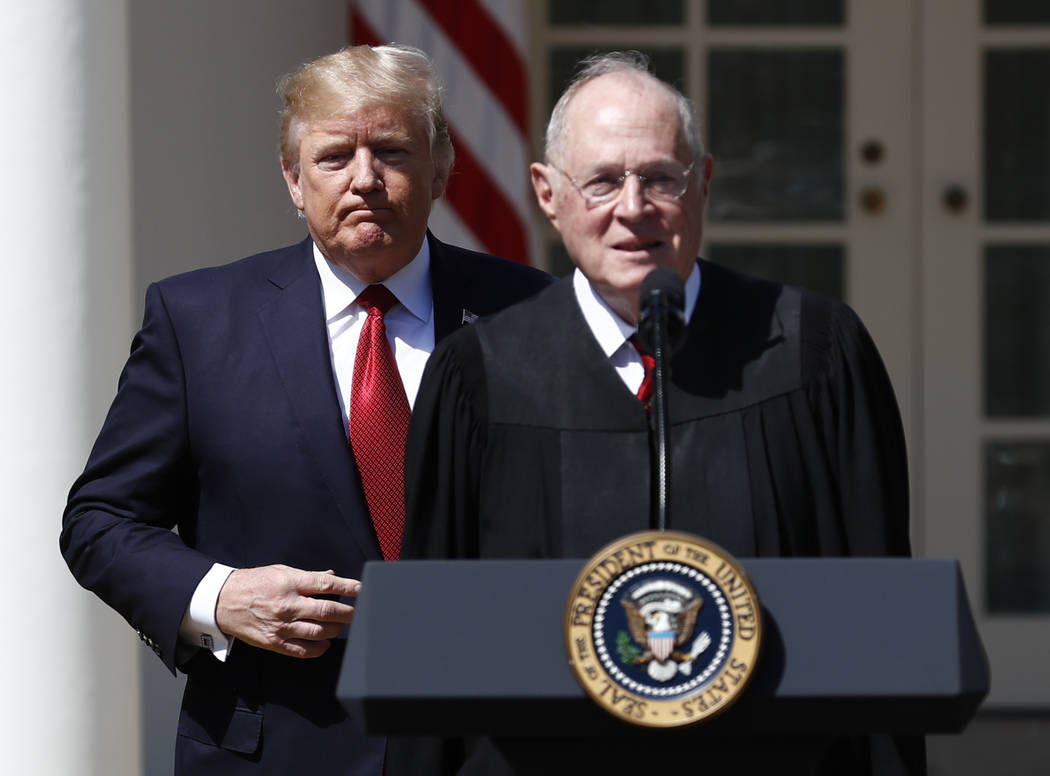Supreme Court Justice Kennedy announces retirement
WASHINGTON — Supreme Court Justice Anthony Kennedy announced his retirement Wednesday, signaling a seismic shift that will settle the nation’s top court on firmly conservative ground.
An appointee of President Ronald Reagan in 1987, Kennedy had come to be known as the top court’s swing vote, at times voting with the bench’s four conservatives and at others with its four liberals.
The 81-year-old jurist from California will leave July 31 as the most influential member of the court, and his decision to retire could determine the outcome of long-standing issues before the court.
Kennedy presented a letter of resignation personally to President Donald Trump at the White House. After their half-hour meeting, Trump described Kennedy as a judge with “tremendous vision and tremendous heart,” adding, “Hopefully, we will pick someone who is equally outstanding.”
“He’s going to be missed terribly by those of us who appreciate moderation,” said Barbara Perry of the University of Virginia’s Miller Center.
Trump told reporters he would “begin immediately” to pick Kennedy’s successor from a list he crafted – and later augmented — with the help of leading conservative legal scholars to demonstrate to skeptical voters he would nominate only strong conservatives.
Trump released the list in 2016 — a move he credits as a key factor in his general election win.
Prominent on the list of possible successors are Judges Thomas Hardiman of Pennsylvania and William Pryor of Alabama, who were seriously considered for the seat eventually filled by Neil Gorsuch in 2017, and Judge Brett Kavanaugh, who serves on the U.S. Court of Appeals in Washington. Judges Amy Coney Barrett, whom Trump named to the appellate court in Chicago, and Raymond Kethledge, a former Kennedy law clerk who serves on the appellate court based in Cincinnati, also may be considered.
Crucial swing vote
Regardless of who replaces him, Kennedy’s departure will be a major change for the high court, where he has been the crucial swing vote for more than a decade.
Conservative leaders have not always been as enamored of the soon-to-retire justice.
In 2015, Kennedy wrote the groundbreaking decision to legalize same-sex marriage, revealing his romantic side. “In forming a marital union, two people become something greater than they once were,” he wrote in a decision backed by the four justices picked by Democratic presidents.
Kennedy also voted with justices appointed by Democrats on abortion rights, affirmative action and the death penalty.
Among Kennedy’s more conservative rulings was his 2010 Citizens United opinion that voided federal campaign finance laws on First Amendment grounds. While the ruling ended federal third-party campaign spending, it stemmed from a Federal Elections Committee attempt to censor an anti-Hillary Clinton documentary.
Carrie Severino of the conservative Judicial Crisis Network called Kennedy a “transformative judge” with enormous impact in many major cases.
“Justice Kennedy was a passionate defender of individual liberty and the separation of powers,” she said in a statement.
David Cole, legal director of the American Civil Liberties Union, hailed Kennedy as “a critical moderating force on the Supreme Court for decades,” whose “greatest legacy may rest with his decisions recognizing the dignity and rights of lesbian, gay and bisexual people. His attention to human dignity and individual rights will be missed.”
But on a conference call organized by special interest groups, activists lamented Kennedy’s support this week for Trump’s travel ban and a ruling Wednesday that government workers cannot be forced to pay union dues.
The McConnell rule
Until last year, Supreme Court nominees needed 60 votes to avoid a Senate filibuster and win confirmation. But last year, as it became clear that Gorsuch could not clear the 60-vote hurdle, the GOP-controlled Senate changed the rules to allow a Supreme Court confirmation by majority vote. Gorsuch was confirmed in a 54-45 vote, with three Democrats voting yes.
On the Senate floor Wednesday, Minority Leader Chuck Schumer urged Republicans to follow Majority Leader Mitch McConnell’s 2016 rule “not to consider a Supreme Court nominee in an election year.” To do otherwise, he argued, “would be the absolute height of hypocrisy.”
McConnell had argued that within the year voters would choose a president who then should be able to pick his or her preferred nominee to replace Justice Antonin Scalia, who died suddenly in February 2016. That’s not the case this year, when midterm elections will be held.
“He had to do that for the politics of it,” UVA’s Perry said, “but I just don’t see how that’s even possible.”
Since Republicans hold a 51-49 majority in the Senate, whoever Trump nominates stands a good chance of being confirmed. And even if a few GOP senators do not support his nominee, Trump likely will be able to pressure Democrats running for re-election in states he won to support his pick.
“Democrats want judges who will rewrite the Constitution, any way they want to do it, and take away your Second Amendment, erase your borders, throw open the jailhouse doors and destroy your freedom,” Trump said at an appearance in Fargo, North Dakota, on Wednesday.
Discussing how activists would fight whoever Trump nominates, Michael Keegan of People for the American Way targeted GOP senators from Maine, Alaska, Ohio and Nevada.
“Susan Collins and Lisa Murkowski can’t tell themselves that they are pro-choice and confirm a judge who will overturn Roe (v. Wade). And Rob Portman can’t pretend he cares about marriage equality and support a judge who will strip the rights away from gay people,” he said. “Dean Heller can’t play the moderate and then vote in favor of a nominee who will radically reshape our democracy.”
Senate Republicans and Democrats have been feuding over confirmation rules since 2013, when then-Majority Leader Harry Reid exercised what was known as the “nuclear option” and ended the filibuster for judicial confirmations, except for the Supreme Court.
“You’ll regret this,” McConnell warned, “and you may regret this a lot sooner than you think.”
Until a new justice is confirmed, the court will be split evenly with four conservatives and four liberals.
Severino expects to see Trump’s choice on the bench by the first week of October, when the Supreme Court opens for another year of business.
“I think we’re going to get another Gorsuch,” she said. “I couldn’t be happier.”
Contact Debra J. Saunders at dsaunders@reviewjournal.com or at 202-662-7391. Follow @DebraJSaunders on Twitter. The Associated Press contributed to this report.





























